汉语不会取代英语成为世界语言
汉语会取代英语作文
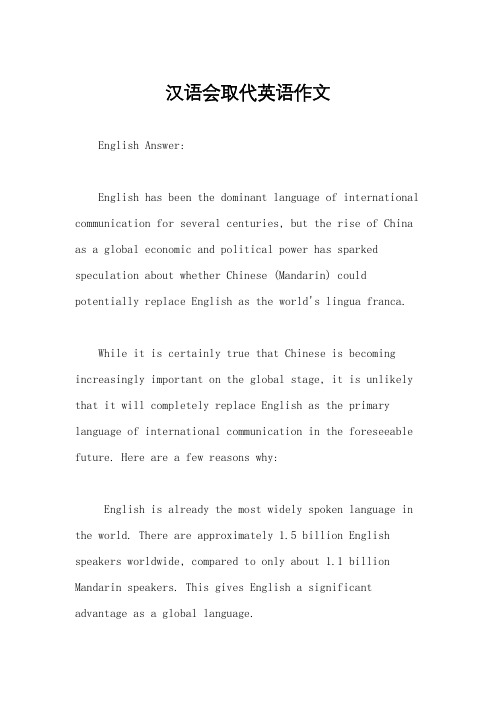
汉语会取代英语作文English Answer:English has been the dominant language of international communication for several centuries, but the rise of China as a global economic and political power has sparked speculation about whether Chinese (Mandarin) could potentially replace English as the world's lingua franca.While it is certainly true that Chinese is becoming increasingly important on the global stage, it is unlikely that it will completely replace English as the primary language of international communication in the foreseeable future. Here are a few reasons why:English is already the most widely spoken language in the world. There are approximately 1.5 billion English speakers worldwide, compared to only about 1.1 billion Mandarin speakers. This gives English a significant advantage as a global language.English is the language of business, science, and technology. It is the language of the internet, the world's most important source of information and communication. It is also the language of many of the world's leading universities and research institutions.English is the language of diplomacy. It is theofficial language of the United Nations and many other international organizations. This gives it a unique status in the world of international relations.Of course, it is possible that Chinese could become more important in the future as China's economic and political power continues to grow. However, it is unlikely that it will ever completely replace English as the world's lingua franca.中文回答:英语作为国际交流的主要语言已有几个世纪的历史,但中国作为全球经济和政治大国的崛起引发了人们对汉语(普通话)是否有可能取代英语成为世界通用语的猜测。
汉语将成为世界语言英语作文
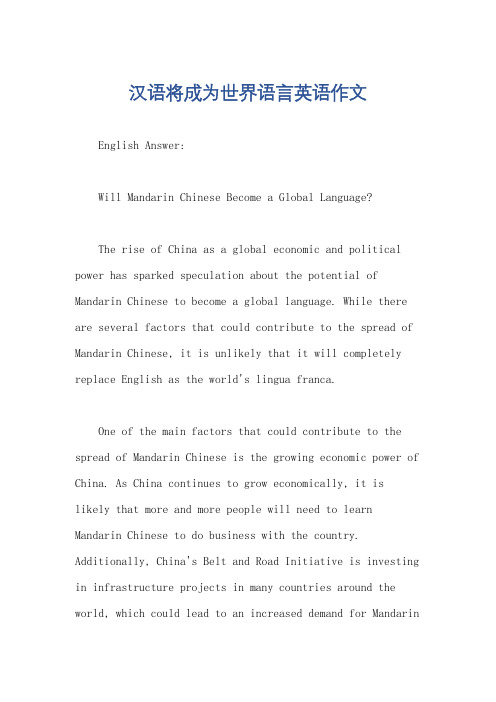
汉语将成为世界语言英语作文English Answer:Will Mandarin Chinese Become a Global Language?The rise of China as a global economic and political power has sparked speculation about the potential of Mandarin Chinese to become a global language. While there are several factors that could contribute to the spread of Mandarin Chinese, it is unlikely that it will completely replace English as the world's lingua franca.One of the main factors that could contribute to the spread of Mandarin Chinese is the growing economic power of China. As China continues to grow economically, it islikely that more and more people will need to learn Mandarin Chinese to do business with the country. Additionally, China's Belt and Road Initiative is investing in infrastructure projects in many countries around the world, which could lead to an increased demand for MandarinChinese language skills.Another factor that could contribute to the spread of Mandarin Chinese is the growing number of people who are learning the language. According to the Confucius Institute, there are over 30 million people learning Mandarin Chinese outside of China. This number is expected to continue to grow as more and more people realize the importance of the language.However, there are also several factors that could prevent Mandarin Chinese from becoming a global language. One of the biggest challenges is the difficulty of the language. Mandarin Chinese has a tonal language system, which can be difficult for non-native speakers to master. Additionally, the Chinese writing system is very complexand can take years to learn.Another challenge is the lack of a global cultural presence for Mandarin Chinese. While China has a rich and vibrant culture, it is not as well-known as Western cultures. This means that there is less motivation forpeople to learn Mandarin Chinese outside of China.Overall, it is unlikely that Mandarin Chinese will completely replace English as the world's lingua franca. However, it is possible that Mandarin Chinese will become a more important language in the future as China continues to grow in economic and political power.中文回答:汉语将成为世界语言吗?随着中国成为全球经济和政治大国,人们开始猜测汉语有可能成为世界语言。
汉语会成为全球通用语言吗英语作文
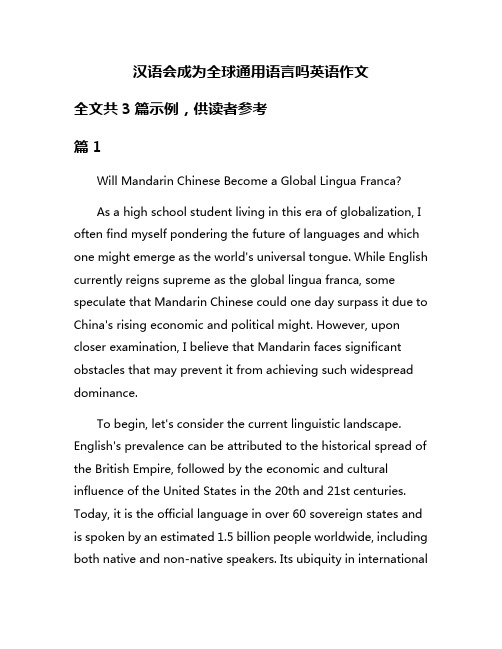
汉语会成为全球通用语言吗英语作文全文共3篇示例,供读者参考篇1Will Mandarin Chinese Become a Global Lingua Franca?As a high school student living in this era of globalization, I often find myself pondering the future of languages and which one might emerge as the world's universal tongue. While English currently reigns supreme as the global lingua franca, some speculate that Mandarin Chinese could one day surpass it due to China's rising economic and political might. However, upon closer examination, I believe that Mandarin faces significant obstacles that may prevent it from achieving such widespread dominance.To begin, let's consider the current linguistic landscape. English's prevalence can be attributed to the historical spread of the British Empire, followed by the economic and cultural influence of the United States in the 20th and 21st centuries. Today, it is the official language in over 60 sovereign states and is spoken by an estimated 1.5 billion people worldwide, including both native and non-native speakers. Its ubiquity in internationalbusiness, diplomacy, academia, and pop culture has solidified its status as the preeminent global language.In contrast, Mandarin Chinese, despite having the most native speakers globally at over 1 billion, has a relatively limited international footprint. It is primarily spoken within China and by members of the Chinese diaspora. While China's economic rise has sparked interest in learning Mandarin, particularly among business professionals and diplomats, its global usage remains confined to specific spheres of influence.One significant barrier to Mandarin's widespread adoption is its written system. Unlike the Roman alphabet used for English, Mandarin employs logographic characters that can number in the thousands. This high degree of complexity presents a formidable challenge for non-native learners, especially those from backgrounds with alphabetic writing systems. The time and effort required to master Mandarin's writing system may dissuade many potential learners, hampering its chances of becoming a truly global language.Additionally, the Chinese government's political and linguistic policies could hinder Mandarin's global spread. While the promotion of Mandarin within China has been a priority, aimed at unifying the country's diverse linguistic landscape, thesame cannot be said for its international promotion. China's authoritarian regime and occasional hostility towards Western values and institutions may deter some countries and individuals from embracing Mandarin wholeheartedly.Furthermore, the linguistic diversity within China itself poses a challenge. While Mandarin is the official language, numerous regional varieties and dialects, such as Cantonese and Hokkien, are spoken by millions of people. These linguistic differences can create barriers to communication and hinder the standardization efforts necessary for Mandarin to become a truly global language.In contrast, English benefits from its relative linguistic homogeneity, with variations in accent and vocabulary being relatively minor compared to the differences between Mandarin and other Chinese dialects. This uniformity facilitates easier communication and dissemination of materials, contributing to English's global appeal.Moreover, the cultural and ideological underpinnings of English have played a significant role in its widespread adoption. The values of individualism, freedom of expression, and democratic ideals, which are often associated withEnglish-speaking nations, have resonated with many culturesaround the world. Conversely, Mandarin's association with China's authoritarian regime and state-controlled media may make it less appealing to those who prioritize personal liberties and free speech.It's also worth noting that English has deeply permeated various domains, such as science, technology, and popular culture. From academic journals to Hollywood movies and music, English has become the lingua franca of these global industries. Dislodging its dominance in these areas would require a monumental effort, as the inertia and network effects of English's widespread use are substantial.That being said, Mandarin's potential should not be entirely discounted. China's continued economic growth and increasing international influence could provide incentives for more people to learn the language. Additionally, the Chinese government's initiatives to promote Mandarin abroad through programs like the Confucius Institutes could bear fruit in the long run.However, for Mandarin to truly challenge English's supremacy, it would need to transcend its current status as a language primarily learned for economic and pragmatic reasons. It would need to become a language of cultural exchange, one that captures the imagination of people worldwide and isembraced not just for its utility but also for its richness and beauty.In conclusion, while Mandarin Chinese's future trajectory is uncertain, its ascent to become the next global lingua franca faces significant hurdles. The entrenched dominance of English, the complexity of Mandarin's writing system, China's political and linguistic policies, and the cultural and ideological associations of the two languages all present formidable obstacles. However, the ever-changing dynamics of globalization and the unpredictable nature of linguistic evolution mean that nothing is set in stone. Only time will tell if Mandarin can surmount these challenges and achieve truly global reach. As a student living in this era of rapid change, I eagerly await to see how the linguistic landscape evolves in the years to come.篇2Will Mandarin Become the Next Global Language?As someone born into the digital age, I've grown up witnessing the world become increasingly interconnected. With a few taps on a screen, I can video chat with friends across the globe, watch movies from any culture, and access boundless information on every topic imaginable. This global connectivityhas brought people closer together than ever before, allowing for the free flow of ideas, values, and perspectives across borders.However, one fundamental barrier remains – the thousands of languages spoken around the world, making cross-cultural communication challenging. For centuries, the world has relied on lingua francas – bridge languages that facilitate dialogue between disparate societies. Latin, Arabic, French and most recently English have all served this role at various points in history. But as the world's center of economic and cultural gravity continues shifting eastward, many are wondering if Mandarin Chinese could become the next global tongue.To understand Mandarin's potential as a lingua franca, we must examine what factors have traditionally elevated certain languages to that status. Firstly, a global language is inextricably tied to the economic and political dominance of its native region. Latin spread via the mighty Roman Empire, while Arabic flourished during the Islamic Golden Age. French proliferated due to Europe's colonial exploits. And English, the current global lingua franca, is deeply rooted in the cultural and economic hegemony of the Anglosphere over the past few centuries.This connection between linguistic and economic power is crucial because it provides immense pragmatic incentive for people around the world to learn the language. After all, why take the time to learn Slovenian when mastering English opens doors to education, employment, media, and communication in most corners of the world? This self-perpetuating cycle –economic might facilitates language spread which reinforces economic dominance – is key to any lingua franca's ascent.Examining this criteria, Mandarin certainly seems to have potential. China is already the world's second largest economy and is projected to surpass the United States as the biggest within the decade. Hundreds of millions have been lifted from poverty as China rapidly modernizes and urbanizes. Its economic tendrils now extend across the globe through the Belt and Road initiative and entities like the Asian Infrastructure Investment Bank.This economic clout is translating into increasing cultural influence as well. Films like Crouching Tiger, Hidden Dragon, Hero and House of Flying Daggers have found international audiences enthralled with Chinese storytelling and aesthetics. Likewise, the worldwide popularity of traditional Chinese arts likecalligraphy, painting, architecture, and cuisines like Cantonese and Sichuan are familiarizing the world with Chinese culture.At the same time, the Chinese government has actively promoted Mandarin's global spread. Hundreds of Confucius Institutes have opened at universities worldwide to teach Chinese language and culture. Major multilateral institutions like the UN and World Bank have added Mandarin as working languages. And within China itself, ethnic minority languages are often suppressed in favor of Mandarin to solidify national unity.Yet despite these favorable conditions, significant barriers still exist to Mandarin becoming a true global lingua franca. Most glaringly, the language's writing system utilizes logographs that make it painstaking for non-native learners to master. Just memorizing a few thousand of the most common characters can take years of dedicated study – a stark contrast to English's relatively simple alphabetic system.Even for native speakers, chinese writing poses hurdles. The lack of unified spellings and accents across different regions like Cantonese and Sichuanese impedes mutual intelligibility. Government efforts to promote a standardized putonghua or "common tongue" have helped unify spoken Mandarin but major dialectical variations persist.Then there are the technological challenges. Unlike the Latin alphabet that transitions seamlessly to computer interfaces, encoding Mandarin's complex characters has historically been fraught with display issues across different digital platforms and operating systems. And while speech recognition and translation tools have rapidly improved, producing truly seamless multilingual communication remains a hurdle.Culturally, Mandarin's lack of grammatical elements like tense, gender and plurals makes it highly contextual and reliant on tone and implied meaning to convey nuance. This high "context culture" can make the language feel ambiguous and indirect to low-context societies accustomed to more explicit communication norms. These gaps in directness and interpretation can fuel cultural misunderstandings.Geopolitically, China's human rights record, territorial disputes with neighbors, and aims to supplant US hegemony have fueled global distrust in Beijing's intentions. This could motivate societies to resist Mandarin's spread as a means of pushing back on China's illiberal model of governance and values.So in many ways, Mandarin's path to becoming a global lingua franca ismuddied. It enjoys immense economic tailwindsand the backing of an ascendant superpower actively promoting its language's expansion. Yet thorny logistical, cultural, and political barriers exist that could impede its universality. Perhaps the most likely scenario is that Mandarin emerges as the regional lingua franca of Asia while English retains its global primacy for another century.Ultimately though, the rise and fall of languages as bridges between cultures have ebbed and flowed throughout human history. Just as Latin and Sanskrit faded from world stage, English's hegemony is unlikely to persist indefinitely. And if economic, technological and cultural forces align in coming decades, Mandarin could well be perfectly poised to become the world's next common tongue, connecting a truly globalized humanity. Only time will tell which language emerges as the Esperanto that our hyper-connected future demands.篇3Will Mandarin Chinese Become the World's Universal Language?As a high school student in this increasingly globalized world, I often find myself pondering the future of languages and which one might eventually become the global lingua franca. WhileEnglish currently dominates as the international language of business, diplomacy, and pop culture, could we one day live in a world where Mandarin Chinese reigns supreme? In this essay, I will explore the potential for Mandarin to usurp English's role and assess whether such a linguistic shift is likely or even desirable.To begin, we must acknowledge the tremendous economic and political clout China has amassed over recent decades. As the world's most populous country and second-largest economy, China's international influence is undeniable. Mandarin, the most widely spoken form of Chinese, boasts over 1 billion native speakers. This prevalence, combined with China's economic might, has already prompted a surge in Mandarin learning worldwide. Many pragmatic students and business professionals are opting to study the language to open doors to the lucrative Chinese market.However, speaking a language does not automatically elevate it to global status - just look at Hindi and Arabic as cases in point. For Mandarin to plausibly supplant English, it would likely require a few key drivers beyond economic incentives alone. Firstly, China would need to further open up its cultural exports and media to the world at large. Currently, Englishlanguage television, music, and films from the West utterly dominate the global entertainment landscape. If Chinese TV shows, movies, and pop music were to gain more international traction and prestige, it could accelerate popularization of Mandarin beyond Sinophone circles.Secondly, China may need to heavily promote Mandarin learning as a soft power initiative on the world stage. Looking back through history, the widespread teaching of English was largely intertwined with the global dominance of the British Empire and later the United States' superpower status in the 20th century. While China has already opened hundreds of state-run Confucius Institutes promoting Chinese language and culture globally, an even more concerted and well-funded push could be required.From a more objective linguistics standpoint, Mandarin's famed tonal system could also pose a significant barrier to its universal adoption. While tonal languages are remarkably common across East Asia and parts of Africa, much of the world's population speaks non-tonal Indo-European or Afro-Asiatic tongues. The counterintuitive prospect of having to master tones as a non-native speaker could prove too challenging or unappealing for many outside of the Sinosphere.Moreover, Mandarin lacks the luxury of a lingua franca script akin to the Latin alphabet. While characters are logographic and thus theoretically transnational, their daunting complexity could hinder literacy acquisition compared to phonetic writing systems. Of course, the future could see China embrace a romanized writing system like Hanyu Pinyin to ease external transmission - though that raises questions of governmental appetite for such a culturally fraught transition.Putting linguistics aside, I cannot ignore the more subjective elements that factor into a language's global appeal and usage: cultural cache, historical narratives, and sociopolitical associations. Fair or not, rightly or wrongly, many around the world may resist Mandarin's rise due to concerns over China's authoritarian governance, human rights record, and a perceived lack of cultural openness or "soft power" appeal compared to English speaking democracies. Fairly or unfairly, this could hamper Mandarin's acceptance as a universally embraced lingua franca.Ultimately, while I absolutely believe Mandarin's global prominence will continue to rise alongside China's economic and geopolitical footprint, I remain skeptical that it can realistically usurp English's centrality in the foreseeable future. Thepragmatic economic incentives exist and Mandarin's sheer population base is undeniable. However, significant structural, linguistic, cultural, and political hurdles may forever relegate it to an incredibly important regional lingua franca and global auxiliary option - but perhaps never the world's undisputed universal language of commerce and communication.English's propulsive head start as the incumbent global language, deeply entrenched in fields as varied as aviation, computing, and academia, is hard to understate. The rising economic and cultural influence of China and other Sinosphere nations could gradually elevate Mandarin as a new co-equal lingua franca alongside English in the centuries ahead. Nevertheless, barring any civilizational cataclysms or seismic geopolitical realignments, I believe English's dominance and worldwide cachet will endure long into the future - even if it happily coexists and shares the world stage with Mandarin.In an increasingly multilingual and multicultural world order, linguistic diversity should be embraced rather than discouraged. While a universal second language streamlines global communication, we would be remiss to let it extinguish our precious polyglot heritage. As a student citizen of this modern era, I welcome the rise of Mandarin on the world stage whilemaintaining a deep respect for the incredible value English has brought in binding humanity across borders and cultures. Perhaps the ideal end state is a bilingual future where English and Mandarin co-exist as co-equal languages of global discourse.。
汉语不会取代英语成为世界语言

汉语不会取代英语成为世界语言英语已经成为一种占据主导地位的全球性语言,这是历史造成的结果。
大英帝国把英语传播到全球许多地方,最早是通过17世纪和18世纪的殖民地开拓,然后通过其在工业革命中占据的领导地位。
随后美国的经济优势和政治领导地位,确保英语成为如今许多国家的第一或第二语言。
这些国家要想转而使用其他任何主要语言,比如法语或西班牙语,将会极其复杂和困难。
我看不出在那种情况下汉语会取代英语,成为世界上最重要的语言。
虽然以汉语为母语的人为数最多,但他们几乎都生活在中国。
中国人历来都不是殖民者,因此如今没有任何地域辽阔而讲汉语的前中国殖民地,而英国、法国和西班牙的前殖民地仍然讲这些国家的语言。
不管怎样,对于世界其他人而言,汉语是一种非常难以学习和掌握的语言。
即使你用拼音形式(罗马字符)来表达汉字,每个汉字(通常是单音节的)还有四个声调来区别字义。
不管怎样,我认为中国人不会抛弃他们的汉字而完全转向使用拼音,因为他们对他们已经延续了5,000多年的语言感到自豪。
汉语完全不同于当今世界上在使用中的其他大多数语言,因为它包括象形文字和表意文字,没有任何拼法或符号来表明每个汉字的正确声调有可能是四个声调中的哪个。
在中国,来自不同地区的人当中没有多少人拥有能说两种语言的能力,因为中国各地的方言差异很大。
在欧洲人当中,能说两种语言的能力更加普遍,因为许多欧洲语言都源自于拉丁文。
在中国和新加坡,已经形成了一个人数较少的双文化精英群体,这个群体由那些母语流利并在不同程度上习得流利英语的人组成。
这个情况之所以发生,很大程度上是为了方便做生意。
然而,很难找到两种语言精通程度相当的人。
中国宣布设立覆盖东海大部分区域的防空识别区(ADIZ),其原因在于中国需要界定其临近区域环境。
这个防空识别区之所以引起争议,部分是因为,中国在首次公布这个防空识别区的时候,制定了超出防空识别区通常施加的规定范围之外的一些额外要求。
此外,这个防空识别区还覆盖到有争议的地区——包括钓鱼岛,并且与日本已经设立的防空识别区重叠。
厉害了我的国:联合国将汉语列为全球通用语言

厉害了我的国:联合国将汉语列为全球通用语言最近媒体们又搞了个大新闻,说联合国最近将汉语列为全球通用语言,和英语,俄语,法语,西班牙语,阿拉伯语共称为:全球六大通用语言。
其实大家都被这条消息带偏了,真实的信息是,早在1946年汉语就已经是联合国六大官方语言,1973年中国重返联合国之后,汉语被确定为联合国工作语言之一。
现在全球通用语言使用最普遍的就是英语、法语、西班牙语和阿拉伯语,汉语也就是中文应该是使用最广泛的语言。
但是小编觉得,汉语成为像英语一样必须学习的第二外语,对于整个世界来说为时不远。
原因就是,随着中国国力的强盛,以后汉语会成为外国最重要的语言之一,外国人也会因为学习好汉语而自豪,因为只有学习好汉语,在关键时刻可以保命,就像老鼠学会猫的语言。
虽然不是很恰当,但是也侧面反映出中国的强大。
在此次肆虐全球的新冠肺炎疫情中,中国的全国战“疫”整个世界是看在眼里,短短两个多月的时间就将一场疫情控制住并在本土基本阻断,无不证实了中国以及中国人民的伟大。
当一个国家的实力不容小觑的时候,文化魅力必然会吸引人们前来。
风靡全球的“汉语热”,很大程度上源于中国经济的强劲,也体现了外界对中国未来发展普遍看好的内在逻辑。
美国金融大鳄罗杰斯曾说:“我这辈子最好的投资,就是让女儿学中文。
”汉语能够持续“发热”,也归功于中国文化的壮大。
不少外国人出于对中国文化的喜爱,才走上学习汉语之路。
他们爱汉语,更爱中国博大精深的文化底蕴。
中华五千年的发展,其实就是汉语的发展,从一开始的”甲骨文“记录事件,到后面慢慢演变成象形文字,再到后来的小篆,隶书,到最后的草书,行书,都承载着中国五千年的历史。
汉语,一般我们定义为:古代汉族群体语言。
汉语发源于公元前14世纪,殷商后期的“甲骨文”被认为是“汉字”的第一种形式,直到今天,各种字体纷纷诞生。
汉语的演变过程:甲骨文-->金文-->小篆-->隶书-->楷书-->草书-->行书。
英文是否会被中文取代作文
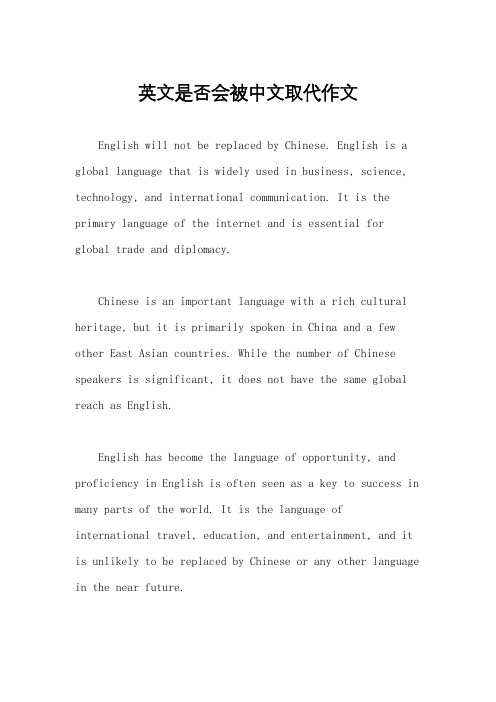
英文是否会被中文取代作文English will not be replaced by Chinese. English is a global language that is widely used in business, science, technology, and international communication. It is the primary language of the internet and is essential for global trade and diplomacy.Chinese is an important language with a rich cultural heritage, but it is primarily spoken in China and a few other East Asian countries. While the number of Chinese speakers is significant, it does not have the same global reach as English.English has become the language of opportunity, and proficiency in English is often seen as a key to success in many parts of the world. It is the language ofinternational travel, education, and entertainment, and it is unlikely to be replaced by Chinese or any other language in the near future.The dominance of English is reinforced by the economic and political power of English-speaking countries, such as the United States and the United Kingdom. As long as these countries remain influential on the world stage, English will continue to be the global lingua franca.In conclusion, while Chinese is an important language with a large number of speakers, it is unlikely to replace English as the global language. English's widespread use in international business, science, technology, and diplomacy, as well as its association with opportunity and success, ensure its continued dominance in the world.。
中文未来的发展英语作文
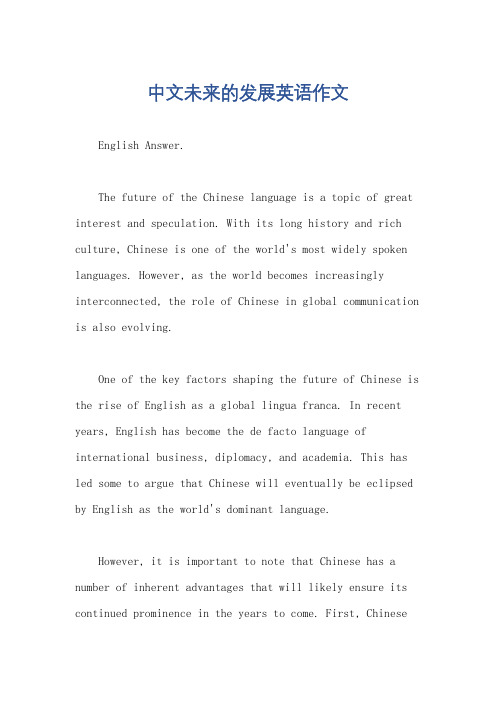
中文未来的发展英语作文English Answer.The future of the Chinese language is a topic of great interest and speculation. With its long history and rich culture, Chinese is one of the world's most widely spoken languages. However, as the world becomes increasingly interconnected, the role of Chinese in global communication is also evolving.One of the key factors shaping the future of Chinese is the rise of English as a global lingua franca. In recent years, English has become the de facto language of international business, diplomacy, and academia. This has led some to argue that Chinese will eventually be eclipsed by English as the world's dominant language.However, it is important to note that Chinese has a number of inherent advantages that will likely ensure its continued prominence in the years to come. First, Chineseis the native language of over 1.3 billion people, makingit the most widely spoken language in the world. Second, China's economy is growing rapidly, and as its economic power increases, so too will the influence of its language. Third, Chinese has a long and rich literary tradition, with a wealth of classical and contemporary works that continue to be read and studied around the world.In addition to these factors, the Chinese government is also actively promoting the spread of its language abroad. In recent years, the government has established Confucius Institutes in over 100 countries, providing free Chinese language instruction to students of all ages. The government has also invested heavily in developing language-learning materials and resources, making it easier for people to learn Chinese.As a result of these efforts, the number of people learning Chinese as a foreign language has grown rapidly in recent years. In the United States, for example, the number of students studying Chinese in secondary schools has increased by over 50% in the past decade. This growth isexpected to continue in the coming years, as more and more people recognize the importance of being able to communicate in Chinese.中文回答:汉语的未来发展是一个备受关注和猜测的话题。
英语的全球化及其影响-教育文档
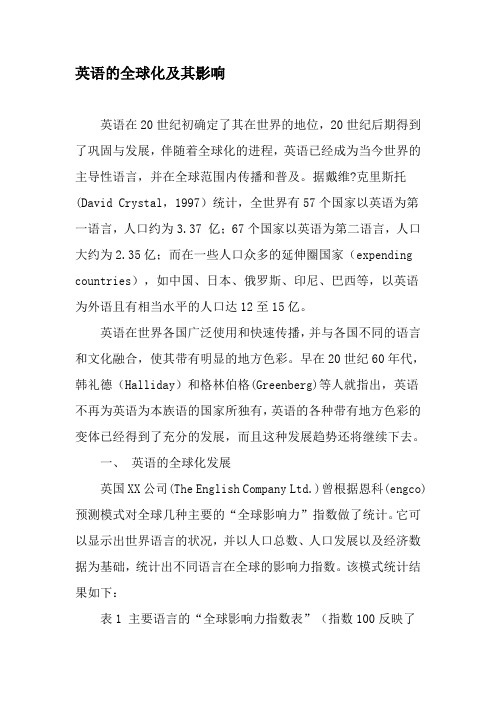
英语的全球化及其影响英语在20世纪初确定了其在世界的地位,20世纪后期得到了巩固与发展,伴随着全球化的进程,英语已经成为当今世界的主导性语言,并在全球范围内传播和普及。
据戴维?克里斯托(David Crystal,1997)统计,全世界有57个国家以英语为第一语言,人口约为3.37 亿;67个国家以英语为第二语言,人口大约为2.35亿;而在一些人口众多的延伸圈国家(expending countries),如中国、日本、俄罗斯、印尼、巴西等,以英语为外语且有相当水平的人口达12至15亿。
英语在世界各国广泛使用和快速传播,并与各国不同的语言和文化融合,使其带有明显的地方色彩。
早在20世纪60年代,韩礼德(Halliday)和格林伯格(Greenberg)等人就指出,英语不再为英语为本族语的国家所独有,英语的各种带有地方色彩的变体已经得到了充分的发展,而且这种发展趋势还将继续下去。
一、英语的全球化发展英国XX公司(The English Company Ltd.)曾根据恩科(engco)预测模式对全球几种主要的“全球影响力”指数做了统计。
它可以显示出世界语言的状况,并以人口总数、人口发展以及经济数据为基础,统计出不同语言在全球的影响力指数。
该模式统计结果如下:表1 主要语言的“全球影响力指数表”(指数100反映了英语在1995年的状况)由此模式可以看出,英语作为全球性语言具有无可替代的位置。
英语已成为通用的语言使得无论在上海工作的韩国主管,在布鲁塞尔制定法律的欧盟的德国籍官员,还是在瑞典开会的巴西生物学家都可能讲英语。
英语在全世界各个领域被广泛应用,包括政治、经济、贸易、文化、外交、旅游、通讯、自然科学和人文科学的学术研究等。
据统计,目前世界上有60多个国家把英语作为官方语言,85%的国际组织把英语列为通用语言(联合国、欧盟等),75%的邮件是用英语写的,80%的出版物和互联网信息是用英语出版和发布的,100%的软件源代码是英语格式。
- 1、下载文档前请自行甄别文档内容的完整性,平台不提供额外的编辑、内容补充、找答案等附加服务。
- 2、"仅部分预览"的文档,不可在线预览部分如存在完整性等问题,可反馈申请退款(可完整预览的文档不适用该条件!)。
- 3、如文档侵犯您的权益,请联系客服反馈,我们会尽快为您处理(人工客服工作时间:9:00-18:30)。
汉语不会取代英语成为世界语言
英语已经成为一种占据主导地位的全球性语言,这是历史造成的结果。
大英帝国把英语传播到全球许多地方,最早是通过17世纪和18世纪的殖民地开拓,然后通过其在工业革命中占据的领导地位。
随后美国的经济优势和政治领导地位,确保英语成为如今许多国家的第一或第二语言。
这些国家要想转而使用其他任何主要语言,比如法语或西班牙语,将会极其复杂和困难。
我看不出在那种情况下汉语会取代英语,成为世界上最重要的语言。
虽然以汉语为母语的人为数最多,但他们几乎都生活在中国。
中国人历来都不是殖民者,因此如今没有任何地域辽阔而讲汉语的前中国殖民地,而英国、法国和西班牙的前殖民地仍然讲这些国家的语言。
不管怎样,对于世界其他人而言,汉语是一种非常难以学习和掌握的语言。
即使你用拼音形式(罗马字符)来表达汉字,每个汉字(通常是单音节的)还有四个声调来区别字义。
不管怎样,我认为中国人不会抛弃他们的汉字而完全转向使用拼音,因为他们对他们已经延续了5,000多年的语言感到自豪。
汉语完全不同于当今世界上在使用中的其他大多数语言,因为它包括象形文字和表意文字,没有任何拼法或符号来表明每个汉字的正确声调有可能是四个声调中的哪个。
在中国,来自不同地区的人当中没有多少人拥有能说两种语言的能力,因为中国各地的方言差异很大。
在欧洲人当中,能说两种语言的能力更加普遍,因为许多欧洲语言都源自于拉丁文。
在中国和新加坡,已经形成了一个人数较少的双文化精英群体,这个群体由那些母语流利并在不同程度上习得流利英语的人组成。
这个情况之所以发生,很大程度上是为了方便做生意。
然而,很难找到两种语言精通程度相当的人。
中国宣布设立覆盖东海大部分区域的防空识别区(ADIZ),其原因在于中国需要界定其临近区域环境。
这个防空识别区之所以引起争议,部分是因为,中国在首次公布这个防空识别区的时候,制定了超出防空识别区通常施加的规定范围之外的一些额外要求。
此外,这个防空识别区还覆盖到有争议的地区——包括钓鱼岛,并且与日本已经设立的防空识别区重叠。
这造成了当商用飞机飞过重叠区时不同管控机构发布相互矛盾的指令的可能性。
从根本上讲,防空识别区不能妨碍在所有海洋和领空的航行自由——这是国际法中已得到广泛接受的一条规定,而且也对这个联系日益紧密的世界有利。
我认为这一点并没有发生变化。
虽然我认为,即便在双边谈判失败的情况下,国际仲裁或判决与武装冲突相比会更加可取,然而像中国这样的一个大国也不大可能服从于国际法庭作出的裁决。
凭借13亿的人口——相比之下美国的人口为3亿——加上持续增长的经济,中国的国内生产总值(GDP)必然会在本世纪超越美国。
在这样的权力局面转变下,美国在太平洋地区影响力的分界线(介于关岛和夏威夷之间)可能会发生变化。
美国在亚洲地区拥有许多朋友和盟友,但美国必须记住,中国在亚洲地区的利益和影响力正在持续增强。
虽然亚洲许多国家也希望与美国保持友好关系,但中国已经是这些国家的最大贸易伙伴。
随着中国企业迈向国际化,中国也在海外投资,因为它需要获取矿产及其他自然资源。
此外,中国也已经表明了成为海上强国的意图。
因此,美国加强自己与亚洲地区的联系是至关重要的。
奥巴马政府的“亚洲再平衡策略”是美国朝着正确的方向迈出的一步,但这项策略必须长期坚持下去。
1/ 1。
